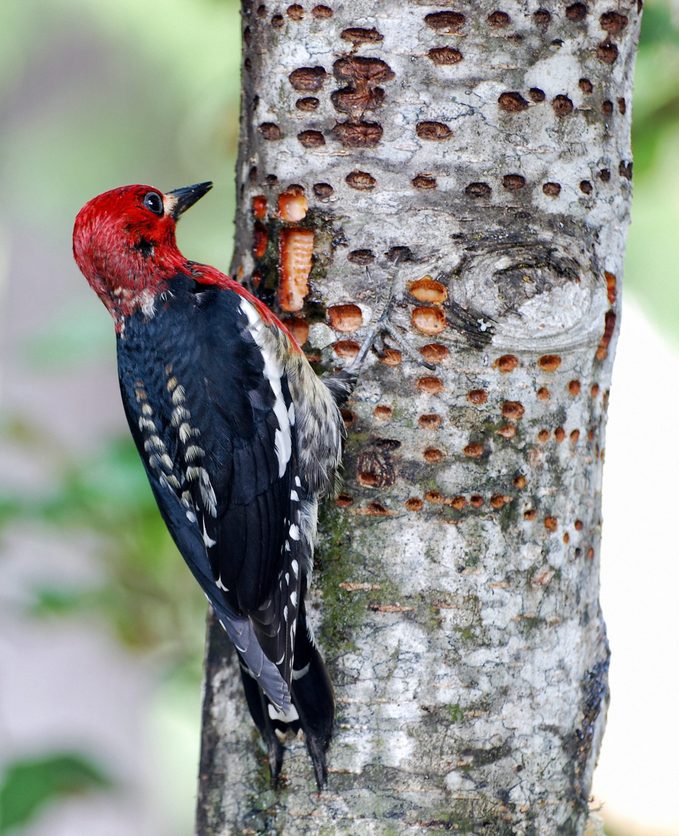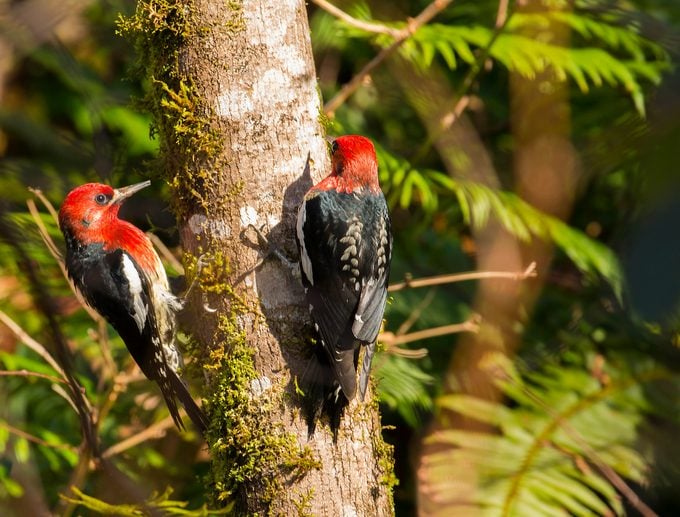How to Identify a Red-Breasted Sapsucker
Updated: Sep. 12, 2023
If you're seeing rows of holes on trees, they might be from a red-breasted sapsucker! Learn what the birds look like and where to find them.
What Does a Red-Breasted Sapsucker Look Like?

A red-breasted sapsucker is a striking sight as it moves along tree trunks in search of sap. Males and females are both about the size of robins and have a red head with a whitish stripe at or near the beak. Red feathers extend down to the upper part of the breast, where coloration then becomes mostly dusty white with slight black stripes.
Wings feature black markings, along with a white-and-black pattern in the center of the back. A large white stripe appears on the edge of the wing closest to the breast. Juvenile red-breasted sapsuckers lack the red head of adult birds.
Learn more about the sapsucker bird family.
Red-Breasted Sapsucker Range and Habitat

It’s easiest to spot a red-breasted sapsucker in forests of aspen, willow or alder. Their range stretches from central California to southeastern Alaska. In the winter, they’re typically spotted in forest habitats along coastlines, or even in suburbs or parks.
“I rarely bring my camera, let alone my long lens, on long walks, but I wanted to get a few images of some interesting bark. On the way there, I noticed this pair of red-breasted sapsuckers (ab0ve). It was the first time I’ve seen them on the trail! I couldn’t believe my luck,” says Birds & Blooms reader Claudia Cooper.
Here’s how to identify a yellow-bellied sapsucker—and attract them to your yard.
What Does a Red-Breasted Sapsucker Eat?
A key component of sapsuckers’ diet is in their name: sap! The birds drill trademark rows of holes in trees in search of tree sap. They’ll also eat plenty of insects, as well as fruit. It’d be unlikely to spot one at your typical bird feeders, although they might stop by to snack on suet.
That said, you’d be far more likely to spot them in your trees. Sapsucker holes are rarely deep enough to cause harm to a tree, so they’re not a cause for concern.
Do woodpeckers visit hummingbird feeders?
Nesting Habits
Red-breasted sapsuckers excavate a nest cavity in a deciduous tree. The nest can be up to 50 or 60 feet off the ground, and birds might return to the same tree year after year to build the nest. A typical clutch size includes four to seven eggs. Parents incubate eggs for about two weeks, and the young leave the nest three to four weeks after hatching.
What does a baby woodpecker look like?
Calls and Sounds
Red-breasted sapsuckers employ a variety of calls and chirps. The most recognizable might be a loud, high-pitched weep, which the bird repeats several times. They give other rattles and squeaks as well.
Next, impress your birding friends with these mind-blowing facts about woodpeckers.




















